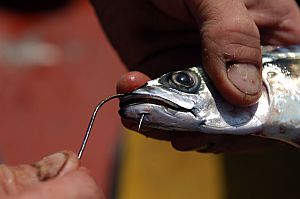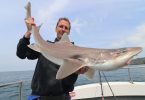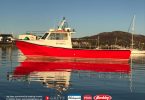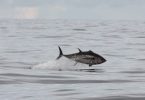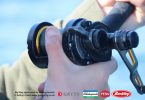Everyone loves to catch bass, but how are you going to target a double-figure fish? Boat Fishing Monthly Editor, Dave Barham, reveals his top ten tips….
1 When it comes to the top baits for catching huge bass, the top of the lot has to be fresh mackerel. Both livebaits and fresh head and guts are renowned big bass catchers both afloat and from the shore. Make sure you carry some mackerel feathers with you at all times, and do your best to keep any potential baits in the best condition possible.

2 If you can’t get hold of fresh mackerel, then make sure that whatever bait you’re going to use is top quality. The rule here is to go ‘large’. Big bass have big appetites, and more to the point, huge mouths. Don’t be scared of using size 8/0 hooks and three whole squid, or even three whole peeler crabs in one bait. The bigger the bait, the more scent and the more appealing it will be to a double-figure bass.

3 In recent years it has become more and more popular to troll big lures for bass, especially close to shore along rocky coastlines. There have been a fair few big bass caught by ‘accident’ when experimental anglers have decided to troll a couple of lures during the trip back to port. Spending a day or two trolling in areas where you know the bass frequent can really pay dividends. So always keep a few lures on board just in case.

4 Strong, super sharp hooks are essential if you want to catch a big bass. The sheer power of a double-figure specimen is enough to straighten a modest Aberdeen pattern. Go for a size 6/0, heavy gauge wire pattern and you’ll be glad you did when that 15-pounder slips into the net! If you’re using treble hooks with livebait, make sure they are man enough for the job too.

5 As far as main line goes, the modern superbraids take some beating, especially when you’re fishing in fast tides or deeper water. Using braid when fishing with livebaits adds a new dimension to your fishing, and you can actually feel the baitfish panicking on the end of your line as a bass goes in for the attack!
As a general rule, 20lb to 30lb breaking strain will cover all situations.

6 Whether you’re using braided main line of just mono, it’s a very good idea to add a 15ft length of 30lb to 50lb clear mono (preferably fluorocarbon) to act as a shockleader. Not only will this leader absorb the violent headshakes and lunges from a big bass, it will also help combat snags and rough ground as the hooked fish dives for cover.

7 Floatfishing with livebaits is becoming increasingly more popular – probably because it is one of the most effective methods of catching bass we know! There are numerous makes of large float available, but go for something that can carry at least 2oz of weight, plus your livebait. The one pictured is manufactured by Zebco and can take 3oz and a 1lb mackerel livebait comfortably.

8 A common mistake made by anglers searching for big bass is to fish too light. It’s very important to use a rod that has plenty of backbone and stopping power – especially when fishing over wrecks and reefs (where big bass love to hunt). If your rod is too soft, a hooked fish will soon take advantage and find some rough stuff to smash you on. Go for a rod with a high carbon content in the 12lb to 20lb class to get the best sport, and give you the best chance of landing your prize.

9 Bass fishing can be frustrating at the best of times, and some days they just don’t play ball at all. Often increasing or decreasing the amount of lead you are using, depending on the tide, can make all the difference to your bait presentation. You only have to watch a commercial bass angler fishing with live sandeels to see that they switch leads frequently as the tide dies or increases. So, make sure you carry a good selection of leads with you from 1oz right up to 12oz.

10 Last but not least is possibly the most important tip of them all – fluorocarbon hooklengths! This magical material has really stamped its place firmly in the history books as being the bass anglers’ best friend. It’s particularly effective in depths down to 40ft, and an essential addition to your armoury in shallow water. There’s no need to go any higher than 20lb breaking strain, and a spool of good quality fluorocarbon line is well worth the price tag if you want to bag yourself a double!


For more great features, tips and advice, visit
www.boat-fishing-monthly.co.uk

